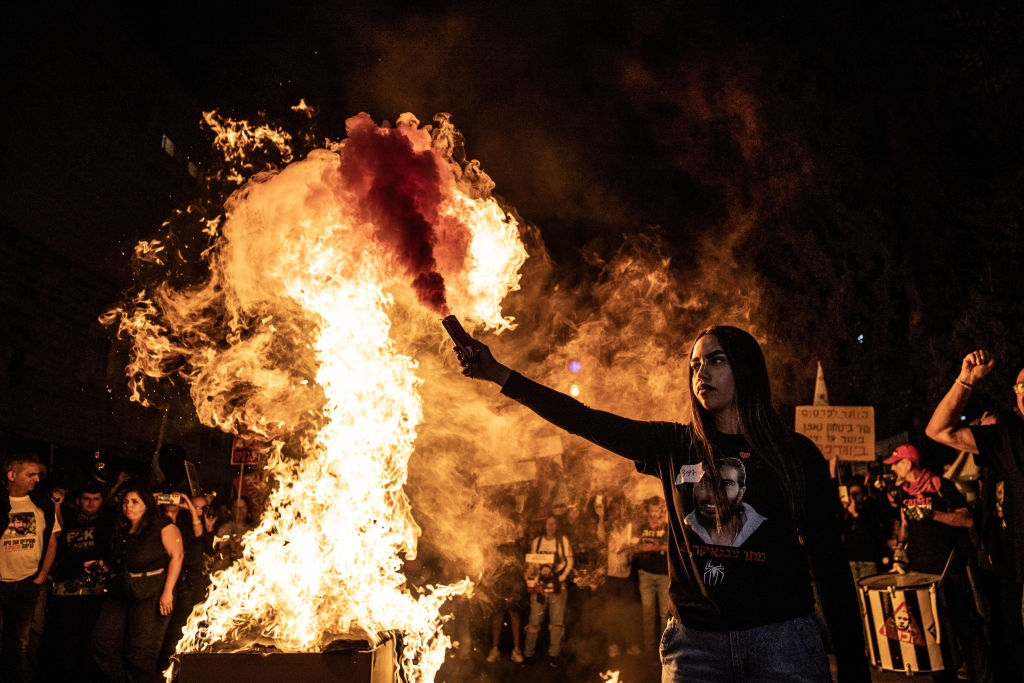News that Qatar has suspended its role as a mediator between Israel and Hamas has come as a devastating blow to the families of the more than 100 Israeli hostages still believed to be in Gaza. Given that neither Israel nor the United States communicates with Hamas directly, they now have no avenue to negotiate with the terrorist group.
In Israel, many have reacted to the news with despair, arguing that returning the hostages ceased to be a priority for the government some time ago. In the public’s eyes, this development now gives Prime Minister Benjamin Netanyahu an excuse to continue the war without the pretence of negotiating a ceasefire and hostage-return deal.
As the Left-wing journalist Zvi Barel commented yesterday, Qatar’s withdrawal is highly convenient for Netanyahu, since it gives him an “exemption” from having to continue the negotiations, without harming him politically.
Einav Zangauker, whose son Matan was taken on 7 October and who has since become one of the most prominent campaigners for a ceasefire deal, responded to the news with renewed calls for an immediate end to the war. “There is nothing left to do in Gaza, the entire security establishment says this. But Netanyahu refuses for criminal political reasons,” she said online. “How is it that since the assassination of Sinwar, no Israeli proposal has been made? How, instead of taking advantage of the momentum, did we make the Qataris withdraw from the mediation?”
Yet the political risks to the government over the continued failure to return the hostages are declining. Among many Israelis, there is a creeping acceptance that they are not going to be returned. There are still regular street protests, but their energy and momentum are in decline.
This is surprising given the 1000-prisoner swap that enabled the return of kidnapped soldier Gilad Shalit in 2011, and the sentiments of the days immediately after 7 October. Few then would have said that Israel would effectively accept the loss of 100 civilians to the dungeons and cellars of Gaza.
But we are in a very different world to that of one year ago. Early in the war, supporters of the governing Likud and other Right-wing parties began to turn against the hostage families, seeing their protests as undermining the war effort. This sentiment has now spread to more of the population, especially since the opening of the new front against Hezbollah and the exchange of fire with Iran, with the result that many more moderate Israelis have now given up on returning the hostages.
Neta Heiman, whose mother Ditza was released during the short-lived ceasefire of November last year, admits that she is “tired of shouting in the streets”, but has not yet abandoned hope of seeing the return of the remaining abductees. Currently, Heiman and other hostage families are working on a legal case to transfer responsibility for conducting a ceasefire deal to the government as a whole, rather than in “in all kinds of invented forums, such as the war cabinet, which in practice leave the issue in the hands of the prime minister and those close to him”. In their view, this approach gives Netanyahu leeway to secretly scupper attempts for a ceasefire and hostage deal.
For their part, Qatari representatives have said that they are willing to take up their role as mediators once again, if they believe that both sides are negotiating in good faith. But given the declining political pressure on Netanyahu to secure a deal, it is unlikely there will be a return to negotiation anytime soon.











Join the discussion
Join like minded readers that support our journalism by becoming a paid subscriber
To join the discussion in the comments, become a paid subscriber.
Join like minded readers that support our journalism, read unlimited articles and enjoy other subscriber-only benefits.
Subscribe